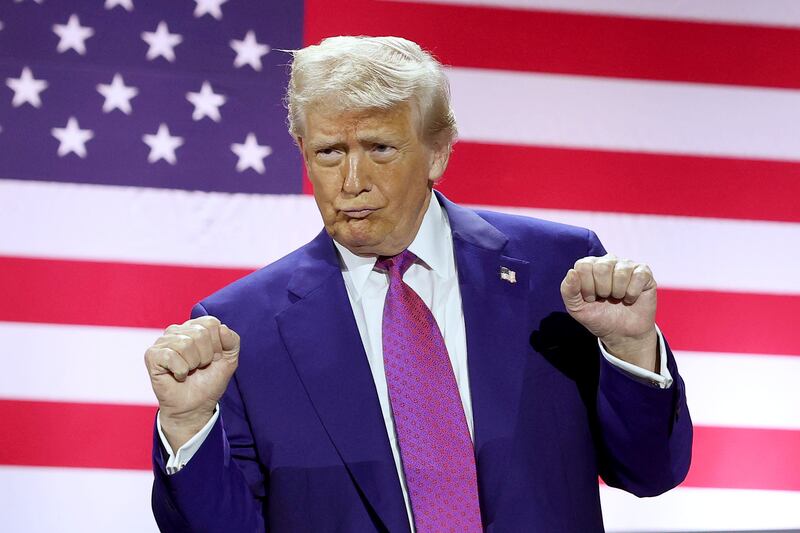Far-right leaders across the modern world—Viktor Orbán, Recep Tayyip Erdoğan to Rodrigo Duterte to name just a few examples—have often presided over periods of social unrest and economic decline. In theory, the uncertainty that characterizes their rule constitutes a failure of governance. In practice, however, it often serves as a useful political strategy, solidifying support through both the metaphorical and literal creation of crisis.
The current state of the United States under Donald Trump is no exception. Take Trump’s seemingly irrational tariff wars, which have shocked the stock market, discouraged foreign investments, weakened the dollar and cooled both global trade and international relations. Is the president trying to reshore manufacturing? Pressure other countries into signing more favorable trade agreements? Push the federal reserve to lower interest rates to refinance national debt payments?
Each of these explanations, commonly cited by Trump supporters and critics alike, supposes the White House is applying a kind of economic shock therapy, issuing tough-love policies that hurt the U.S. economy in the short term in order to help it bounce back stronger in the long-run.
It’s a tactic favored by populist leaders, including Trump’s “favorite president,” Argentina’s Javier Milei. But while Milei’s action plan, at the cost of temporary spikes in poverty and unemployment, appears to be working, experts warn that Trump himself stands poised to cause lasting, irreparable damage to the country he has promised to lead into a “golden age.”

“Even though President Trump and his advisers promise economic prosperity in the long term,” Thomas Pepinsky, a professor of government and public policy at Cornell University and nonresident senior fellow at the Brooking Institution, told the Daily Beast, “it looks more like a situation designed to create scarcity and hardship.”
In other words, perhaps the Trump administration doesn’t actually want to improve the economy, but actively weaken it as part of a larger political strategy.
Research has long demonstrated that far-right movements across the world thrive by exploiting feelings of insecurity and uncertainty to deepen sociopolitical divisions and cultivate mistrust in democratic institutions. Periods of crises, from the Great Depression to the Great Recession and the COVID-19 pandemic, create opportunities to generate support by blaming both real and perceived hardship on the political establishment and marginalized groups.
It has also shown that when far-right movements gain power, they rarely bring about the prosperity they promise. On the contrary, they tend to preside over periods of economic stagnation and declining GDP per capita.

But far from undermining their legitimacy, economic turmoil can actually reinforce the authority of right-wing parties and politicians insofar as it turns the largely fictitious boogeymen of their campaign trails—limited resources, job scarcity, rising costs—into real, credible threats. By damaging the markets, a complex process for which responsibility can easily be shifted, they exacerbate the very sentiments that helped bring them to power in the first place.
History has provided several examples of such subversive ‘feedback loops.’ In Nazi Germany, preparations for World War II complicated the country’s recovery from the Great Depression and negatively impacted living standards. Import controls intended to boost domestic agricultural production led to food shortages and increased mortality rates, which in turn made way for propaganda campaigns encouraging citizens to make additional sacrifices in the name of the Reich.
““I’m reminded of a common criticism of the Republican Party… If you insist that the government doesn’t work, and you mess up everything when you’re in government, you’re kind of proving the point, right?””
— Edward Koning, University of Guelph
A more recent example took place in Italy, where controversial 2010 administrative reforms championed by prime minister Silvio Berlusconi and the far-right populist Lega Nord party reduced access to public services, intensifying voters’ concern over immigration and strengthening their support of conservative movements.
This hypothesis is also supported by research in political science, specifically on a concept called securitization. The term “refers to the idea that politicians sometimes try to create or foster crises for the purpose of pushing authoritarian measures,” explained Edward Koning, an associate professor at the University of Guelph in Ontario, Canada, who studies the politics of immigration.
“If you can convince the public that these are unusual times and there’s something really serious and foundational at stake,” Koning continued, “you might be able to get away with more centralization of power, more reductions of checks and balances. Certainly, that seems to be something Trump likes to do.”
Often, these feedback loops are self-sustainable to the point that they can only be broken by revolution or war. Both scenarios involve a shift in the leader’s image—from savior to saboteur, strongman to incompetent, ideologue to opportunist.
Trump, owing to both the country’s military might and the powerlessness of its working class, is unlikely to reach either of these cultural pivot points anytime soon.

